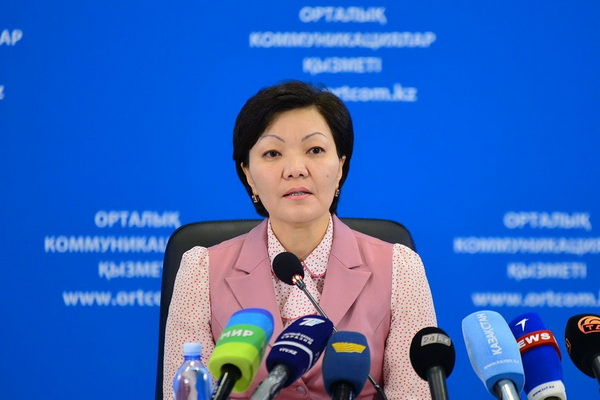Deputy Minister of Labor and Population Social Protection Svetlana ZHAKUPOVA:
KAZAKHSTAN INTENDS TO INCLUDE NEW CATEGORIES OF CITIZENS IN THE LIST OF RECIPIENTS OF SOCIAL SERVICES

The Ministry of Labor and Population Social Protection has devised and submitted a draft concept of further modernization of the social service system for public discussion. Svetlana ZHAKUPOVA, deputy minister of labor and population social protection, told Interfax-Kazakhstan about the planned innovations in the system.
- Svetlana Kabykenovna, tell what the draft concept of further modernization of the social service system envisages. What has been it required for?
- The work on the modernization of the social service system began in 2009 when the Law on Special Social Services was adopted. Over these years the standards for the provision of special social services have been devised and introduced, a transition to the provision of special social services has been implemented, citizens have been given the right to choose social service organizations and the principle of co-financing costs by recipients of services has been introduced.
The new forms of service provision have been developed - daytime care units - that provide daytime employment for people in need [of work], create conditions for receiving services without being separated from the family. I want to emphasize that currently more than 600 children, who were previously in boarding homes, were returned to their families. Now these children continue to receive services in daytime care units, and thanks to that the parents can feel at ease while working.
However, the social service system is still not perfect. We have identified a number of shortcomings; in the first place, this is the provision of social services of declarative nature. That is, until a person does not apply to the social services body for help, s/he actually remains out of the system. The reasons for this are different – in some cases people simply do not know, quite often they feel uncomfortable to admit that they need special help, and so on. This is fundamentally wrong. Also, the tariff system needs to be improved, it is necessary to raise the social workers’ qualification; there are problems with access to social services by rural residents.
The new concept indeed is aimed at solving these problems, as well as expanding the types of special social services. In order to make it as effective as possible, we urge Kazakhstani citizens to provide their comments and suggest mechanisms for the implementation of social assistance. That’s why the concept is posted on the ministry's website together with an electronic address for proposals.
- What is it about the expansion of services types?
- We are talking, in fact, about the new categories of recipients of social services. Currently they [services] are in demand not only on the part of people with disabilities and the elderly, but also of the categories of citizens such as victims of domestic violence or human trafficking, former convicts, persons with no fixed residence.
I want to clarify - when we talk about social services, it is not just about getting benefits from the state. For example, victims of domestic violence need, first of all, the help of a psychologist, a place where they can escape from violent partners. Therefore, for such assistance we will work in close contact with crisis centers for victims of domestic violence, by the way, the number of such centers will increase; we will help with training, finding a job, enrolling children in schools and so on.
Persons with no fixed residence, as a rule, need help in restoring identity documents, medical assistance, employment assistance. Accordingly, here our social services will work in close contact with social adaptation centers.
- You said that currently the social service actually works based on applications. How is this situation to be changed?
- The draft concept includes several main areas of modernization, and firstly, this is aimed at expanding the coverage of citizens by the social service system and strengthening the provided target services. We want the organization of social services under new conditions to be focused on the joint participation of the state, the citizens and the families in it. To this end, measures will be taken to increase social involvement of the citizens themselves, that is, the citizens (the families) will be able to participate in solving their problems. Also, the possibility of receiving services at home with the family members being involved – who are out of work - will be expanded, for whom free training courses will be organized. People receiving services at home will be registered with healtcare and social organizations at their place of residence.
It is also proposed to introduce foster care for disabled children in boarding homes. Children will be sent out to stay with foster or so-called host families for a number of days, months.
There are plans to create the "mobile service". It will be created in order to supply compensatory technical, special hygiene products to target the categories of citizens living in remote populated areas.
- How will the work on identifying the citizens in need of social services be arranged? Even these days people do not always apply for help, and the categories such as the victims of domestic violence, for example, are often afraid even to approach the police not to mention crisis centers.
- Undoubtedly, the modernization of the social service system sets new challenges for administering social services. It is planned to move from “declarative” approaches [based on applications] to approaches based on the identification [of the needy] in terms of offering service in order to make these services more efficient. To this end, the local executive bodies will annually hold contests among social service organizations to determine batches of people in need of special social services.
Based on the survey results a social register of citizens will be created. It will contain personalized information about the recipients of special social services and their social service scheme. It will be updated online. Based on the data of this register the local executive bodies will determine the needs for special social services, the necessary amounts of their financing and provide for tailored social services.
- At the very beginning you mentioned the planned improvements to the tariff system. What kind of innovations will be to this end?
- In order to develop a network of social institutions and create a competitive environment it is necessary to attract private investments and develop public private partnerships. Naturally, the tariffs for the special social services should be attractive for investment. At a minimum, the tariffs should be based on the actual costs of the service providers. In addition, we plan that that the fixed assets replenishment costs be included stage by stage. Now an ad-hoc working group is active at the ministry involving the representatives of the local executive bodies, non-governmental sector, social service providers, where the tariff calculation system is being devised. Once preliminary calculations are completed, we will also submit them for discussion to all of the interested parties.
- Thank you for the interview!
September, 2017
© 2024 Interfax-Kazakhstan news agency
Copying and use of these materials without reference to the source is prohibited
Archive






